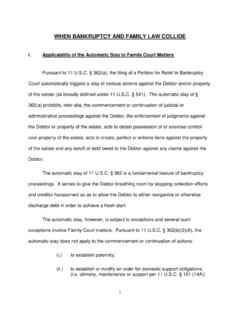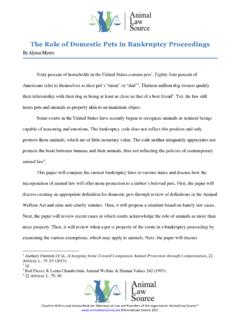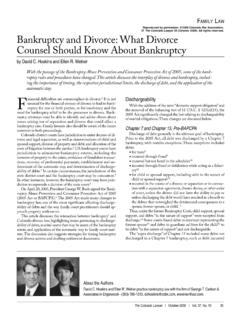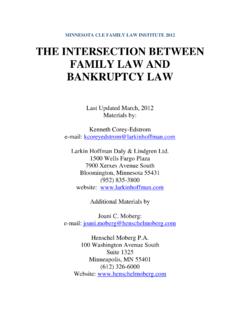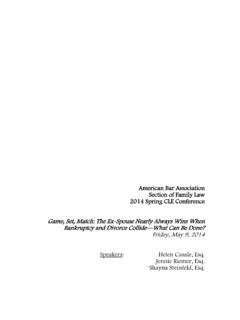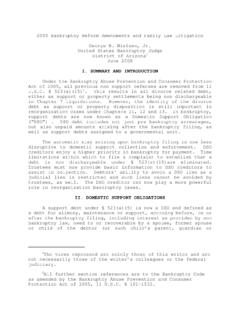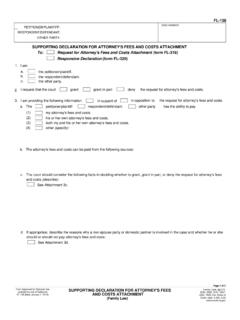Transcription of Dischargeability of Divorce Debts in Bankruptcy: How to ...
1 Dischargeability of Divorce Debts in bankruptcy : How to Determine Whether a Particular debt Will Be Dischargeable if the Obligor Files bankruptcy Diane Brazen Gordon, Esq. bankruptcy , which was once considered by many as a last resort, has become a viable option to save a home or to conserve available income to pay for basic living expenses and for the care of children. The goal of most individuals filing bankruptcy is to obtain a discharge of personal liability for his or her unsecured Debts . Section 523 of the bankruptcy Code may operate to hamper a debtor s goal of a fresh start because that section creates exceptions for certain Debts that are nondischargeable by the The word bankruptcy instills panic in a person who is owed money. Understandably, a person who is owed a Divorce - related debt wants to know if he or she can collect that debt if the former spouse files bankruptcy .
2 If you practice family law, you should know about bankruptcy law s treatment of Divorce Debts so that you can better protect your clients and be able to respond to their questions. Your Divorce client may need the assistance of bankruptcy counsel to protect his or her rights in the bankruptcy case filed by the former spouse. bankruptcy courts must struggle with the competing concerns of giving bankruptcy debtors a fresh start and the payment of marital obligations and support. The recent amendments to the bankruptcy Code have made it much more difficult to discharge Divorce -related Debts in bankruptcy . Creditors owed alimony and support now have much greater ability to collect those Debts . In order to understand the bankruptcy law in this area, it is helpful to know some basic information about the different bankruptcy chapters. Basic Information about Chapter 7 and Chapter 13 bankruptcy cases can be filed under chapters 7, 11, 12, and 13 of the bankruptcy Code.
3 Most individuals file cases under chapters 7 or 13, and those chapters will be our focus. In a Chapter 7 case an individual discharges, or eliminates, personal liability for most unsecured Debts such as credit card debt and medical bills, and keeps property that is within the amounts of the applicable exemptions. A Chapter 7 trustee liquidates a debtor s nonexempt assets and makes payments to the creditors according to certain statutory rules of priority. In a Chapter 13 case a debtor proposes a repayment plan for all or of a percentage of the unsecured Debts . At the end of a Chapter 13 plan, as in a Chapter 7, the debtor receives a discharge of personal liability for most unsecured Debts . If the debtor s gross income is too high, he or she may not qualify for a Chapter A Chapter 13 case may allow the debtor to keep nonexempt property that would be at risk of being sold by a Chapter 7 trustee.
4 Also, in a Chapter 13 a debtor may be able to cure an arrearage on a mortgage or a car loan by paying the arrearage through the Chapter 13 plan. Chapter 13 also provides substantial opportunities to reduce car loan balances on loans for older vehicles and to eliminate second or third mortgages when the property s value is less than the balance owed on the first mortgage. Copyright 2010, Diane Brazen Gordon, All rights of 142 The bankruptcy Code contains exceptions to a debtor s discharge of personal liability. Section 523 of the bankruptcy Code lists these exceptions. Two of these exceptions are the typical ones at issue if you are considering a Divorce - related I will refer to these exceptions as (i) the Domestic Support Obligation (DSO) exception contained in Bankuptcy Code Section 523(a)(5); and (ii) the Property Settlement debt exception, found in bankruptcy Code Section 523(a)(15).
5 Domestic Support Obligation Exception: 11 523(a)(5) Section 523(a)(5) provides that [a] discharge under section 727, 1141, 1228(a), 1228(b), or 1328(b) of this title does not discharge an individual from any debt (5) for a domestic support obligation. 4 A bankruptcy discharge does not discharge an individual debtor from a debt for a domestic support obligation under any chapter of the bankruptcy In a Chapter 13 case, a debtor is required to propose a plan that pays a DSO in The starting point in determining any issue of dischargebility of a Divorce debt is to answer the question: is the debt a Domestic Support Obligation? If the answer is yes, the debt will not be discharged if the debtor files a bankruptcy case under any chapter. BAPCPA added the term domestic support obligation (referred to as a DSO ) to the bankruptcy Code.
6 Domestic Support Obligation is defined in Section 101(14A) of the bankruptcy Code. Section 101(14A) provides that a DSO is: [A] debt that accrues before, on, or after the date of the order of relief in a case under this title, including interest that accrues on that debt as provided under applicable nonbankruptcy law notwithstanding any other provision of this title, that is (A) owed to or recoverable by (i) a spouse, former spouse, or child of the debtor or such child s parent, legal guardian, or responsible relative; or (ii) a governmental unit; (B) in the nature of alimony, maintenance, or support (including assistance provided by a governmental unit) of such spouse, former spouse, or child of the debtor or such child s parent, without regard to whether such debt is expressly so designated; (C) established or subject to establishment before, on, or after the date of the order for relief in a case under this title, by reason of applicable provisions of (i) a separation agreement, Divorce decree, or property settlement agreement; (ii) an order of a court of record; or (iii) a determination made in accordance with applicable nonbankruptcy law by a governmental unit; and (D) not assigned to a nongovernmental entity, unless that obligation is assigned voluntarily by the spouse, former spouse, child of the debtor, or such child s parent, legal guardian, or responsible relative for the purpose of collecting the debt .
7 11 101(14A). Copyright 2010, Diane Brazen Gordon, All rights of 143 The amendments instituted by BAPCPA relative to the definition of a DSO have increased the ability of creditors owed a DSO to collect that In order for a particular debt to be considered a DSO, the debt must meet the four elements contained in the statutory If the debt is not a DSO, but is a property settlement debt , a different Dischargeability provision applies in Chapter 7 The term DSO created by BAPCPA appears in several provisions of the bankruptcy A state court s designation or language in an agreement stating that a debt is support or property settlement is not binding on the bankruptcy court in determining Dischargeability , and a court can look behind such language to determine the real nature of the Even if a decree or marital settlement agreement contains language stating that there is no alimony or that a debt cannot be discharged in bankruptcy , a bankruptcy court can hold that the obligation is not a DSO and is not excepted from discharge under 523(a)(5).
8 12 The majority of courts find that payment of support, maintenance, or alimony need not be payable directly to the spouse or one of the payees listed in the first element of the definition in order to be Factors Courts Look At In Determining Whether A debt Is In the Nature Of a Support bankruptcy courts look to federal law to determine if a particular claim is in the nature of A debt may be in the nature of support within the meaning of section 523(a)(5) even though it would not legally qualify as support under state This is a case-specific, factual determination, with emphasis on whether the obligation was intended to be one for There are many cases, most of which are pre-BAPCPA but are still relevant, which address the criteria courts use to determine if a debt is in the nature of The cases set forth the various factors courts use in determining whether an obligation is in the nature of support and, therefore, The focus of this inquiry is the intent of the parties or the family law court at the time that the obligations were In deciding the Dischargeability of marital obligations, courts analyze the respective financial situation of the parties at the time of the The Sixth Circuit opinion in Long v.
9 Calhoun is widely cited for the factors the courts use to determine whether the obligation was intended to create a support These factors include the actual substance and language of the agreement, the financial situation of the parties at the time of the agreement, the function served by the obligation at the time of the agreement, and whether there is any evidence of overbearing at the time of the agreement that should cause the court to question the intent of a Courts consider all relevant evidence including (i) the parties employment histories and prospects for financial support; (ii) whether one party received marital property; (iii) the number and frequency of payments; (iv) whether it would be difficult for the former spouse and children to subsist without the payments; (v) the length of the marriage; (vi) the economic disparity of the parties; (vii) whether the spouse who brings the complaint is caring for minor children; (viii) age, employability, and education levels of the parties; (ix) the label in the decree or agreement; and (x) whether the obligation terminates upon the obligee s death, remarriage, or the emancipation of the Additional factors include Copyright 2010, Diane Brazen Gordon, All rights of 144 (i) whether there is a waiver of alimony or support in the marital settlement agreement; (ii) the availability of state court remedies to modify or enforce the obligation.
10 And (iii) the tax treatment of the Usually the factors do not all line up on one The bankruptcy court may look to the structure and language of the Divorce decree, as well as state law, in making this decision, but those sources are not Federal courts may look to the state law for the purpose of deciding whether an obligation is actually in the nature of However, the bankruptcy court is not bound by the label given to the obligation in the decree or marital settlement The bankruptcy court will look behind the label to ascertain the intent of the The more of these factors that apply to the particular obligation, the more likely it is that a bankruptcy court will consider the obligation to be nondischargeable Property Settlement debt Exception: 11 523(a)(15) If a Divorce -related debt is not a DSO, the debt will frequently still be excepted from discharge under bankruptcy Code section 523(a)(15).
